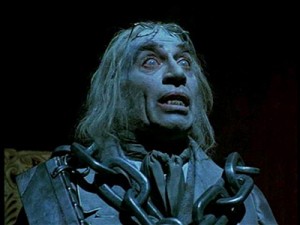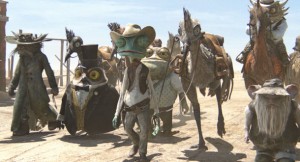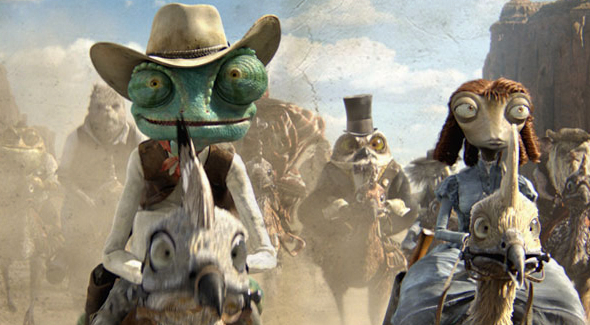[Enjoy this guest post by Elise Czajkowski – Ed.]
Unlikely as it seems for an animated film about a Hawaiian-shirt wearing chameleon, Rango is a brazenly political movie, decrying political corruption while advocating for equitable distribution of resources. To do so, it borrows the template of A Christmas Carol to show the past, present, and future dangers of resource inequality caused by a free market economy.
The film’s main character Rango is forced to see this progression through time so that he might turn away from selfish capitalism, in a story that parallels Scrooge’s famous journey of self-discovery. For just as Scrooge is only concerned with his own bottom line, Rango is initially concerned with his own quest for water in the middle of the barren desert. Water is the most prized possession, and it will symbolize several scarce resources over the course of the film.
Rango, like Scrooge, begins in a sheltered life, deluding himself into believing that he is content. Both are then thrown into another world, literally in Rango’s case. He is tossed out of his comfortable terrarium onto a busy Nevada highway. There, he meets his own version of Marley, in the form of a wise old armadillo known as Roadkill.

Marley tells Scrooge, “It is required of every man that the spirit within him should walk abroad among his fellowmen, and travel far and wide.” Similarly, Roadkill encourages Rango to trek out into the desert. “We all have our journeys to make,” Roadkill tells him, as Rango sets off in search of water. Marley at least gives Scrooge a heads up about what he’s about to encounter in the spirits, while Roadkill only alludes to finding dirt before finding water.
After a disorienting, dehydrated trek through the desert that mirrors Scrooge’s sleepless night, Rango arrives in the town of Dirt, which is filled with Great Depression-era imagery. As Rango arrives, a man packs his family into a carriage and rides off into the sunset. The town’s bank, which stores Dirt’s precious water supply, is cutting off credit to those who need water for their farms. “Times being so hard, we just can’t give no more credit,” the bank manager says. “Folks ain’t making deposits no more.”
Rango then visits the town mayor, an elderly wheel-chair bound turtle, who sips water from his own private stock. What initially seems to be unlucky weather is soon revealed as a far more nefarious scheme. “Control the water and you control everything,” he ominously tells Rango. He oversees an elaborate water-distributing ritual in the town that evokes 1930s breadlines, while making infeasible promises to the townfolk.

His lackeys, who act as the town’s loan sharks, bully poor farmers who can’t pay their mortgage, forcing them to sell their land for nothing. The mayor, we quickly learn, is buying up these properties around Dirt, useless though they are in the drought. When Rango questions the Mayor on these purchases, he shows Rango a modern town that is being built in the desert outside of Dirt.
“What are you building out here?” Rango asks.
“The future, Mr. Rango. The future. One day soon, all this is going to fade into myth. The frontier town, the lawmen, the gunslinger. There’s just no place for them anymore. We’re civilized now.”
On first glimpse, this imagery may seem a little disorienting. The wheelchair-bound mayor is a clear allusion to President Roosevelt. Is the movie implying that FDR was purposefully prolonging the Great Depression in order to further development? It’s true that a significant portion of the US’s current infrastructure is a result of New Deal-era construction. But it seems immensely cynical, even for the federal government, to assume that the president would favor a decade of staggering national poverty in order to build highways and dams.
What the movie is really arguing against is the role of the wealthy businessman, who can abuse resources for his own benefit while harming the working classes. By making the wealthy land owner also the mayor of Dirt, the movie is emphasizing the corrupt role of corporations in America’s political system. The mayor represents the unholy marriage of laissez-faire economics with political lobbying, where the government will never interfere with a company’s right to make money.
Rango even benefits from this cronyism when he is unilaterally made sherriff. Why is there no other authority in Dirt to oversee the sale of property? Instead of portraying the community bank manager as a bad guy – a tempting prospect in these days of anti-banking righteousness – the bank manager is sympathetic, and ultimately disposed of by the mayor’s lackeys. He too is part of the people and his genuine efforts to help the people of Dirt make him a nuisance to the higher-ups.
While those ideas are settling, the movie subtly shifts its aim and the conflict moves into the present day. Instead of representing capital in the 1930s, Dirt’s elusive water supply begins to symbolize the modern day struggles for oil that have defined much of global politics in the past few decades. The movie leans heavily on allusions to the Iraq War, taking a liberal view that presume oil was the cause for the war. Rango and his well-armed crew from Dirt go to fight in a foreign land for their precious resource.
“Don’t y’all worry about a thing,” Rango says to his troops at the beginning. “Come tomorrow we’ll locate that water and return to a hero’s welcome.” The team is tracking three gopher types, who they believe have stolen their water. But when they arrive to surround the thieves, an army of related rodents literally emerge from the sand to defend their side. The ensuing fight is long and complex. Because the movie intermingles species so much, it’s sometimes hard to tell friend from foe. Even the characters in the film can’t quite keep track.

But in the end, the rodents haven’t stolen the water. “No water? Then what the hell we been fighting for?” says one of the baddies, a moment that marks reflection for both sides of the fight.
The water has literally disappeared, having been dumped into the desert by the mayor. When we next see him, he is playing golf with his lackeys, and his references to controlling the water place him in the role of an OPEC-like cartel, determining how much water should be distributed and in what situations. He keeps enough water for himself and his buddies, even holding onto enough to be able to drown an enemy in the middle of the desert. By keeping the townspeople and the rodents fighting over what they believe will be their own enrichment, he is able to distract the people from his own wealth and corruption. He even manages to convince the town people to hang two of the rodents, despite their obvious innocence.
Right about now, things are seeming pretty hopeless. The town is desperate for a rare resource, and has begun an extended, unwinnable war with another tribe. At this point, Rango gets his own otherworldy visit from the Spirit of the West, an archetypal cowboy who tells Rango, “You came a long way to find something that isn’t out here.” Rango is humbled, as Scrooge is at this point, as the Ghost of Christmas Future shows him the terrible days to come. “‘Spirit,’ he cried, tight clutching at his robe, ‘hear me! I am not the man I was. I will not be the man I must have been but for this intercourse.'” Rango, having similarly absorbed the lessons of unregulated capitalism, is allowed a brief glimpse into that future.
Walking back into the desert, Rango stumbles along a Las Vegas golf course, watering it’s greens with perfectly clean water. Water, in this stage, represents actual water. Many economists believe that water wars will break out in the future, as access to clean water becomes a serious problem amidst the growing populations in Asia and Africa. And yet the West continues to be extravagant with this resource. This highlights the disparity of available resources as a result of the past century of corporate capitalism. When this source of water is revealed back in the town of Dirt, the movie’s two villains, the mayor and his henchman rattlesnake, almost immediately turn on each other, a possible allusion to conflicts that might arise between current allies as water becomes more and more valuable in the future.
Luckily, this is the future bit of the story – the part that can still be changed. After discovering this new source of water, the now educated Rango declines to hoard it. Instead, he literally floods the town with it, sharing this precious resource with everyone, including the formerly enemy rodent army. The old guard of capitalist greed and bullying is displaced with a new, socialist attitude of equitable distribution.
Like all good Hollywood movies or radical revolutions, the practicality of this decision isn’t explored. Flooding a town with dirt streets is likely to leave a very muddy avenue and still no clean water, while there is only one farm in Dirt still producing crops. There is no government in place, and like all resources, the water will run out eventually. Unlike Scrooge, who has the power to change his own life for the better forever, Rango is simply one little lizard, trying to take on the world. Unfortunately, history, economics, politics, and logic say he is bound to fail.
Elise Czajkowski is attempting to make it as a freelance writer and general media type person. She would very much like you to read some of her other words at ponderances.tumblr.com.

[Have your own theories on desert politics and lizard economics? Sound off in the comments! – Ed.]
You should probably see the movie ‘Chinatown’ as the water plot in Rango is taken from that even down to the Mayor roll be played by John Huston sound-a-like.
Brilliant movie though. My favorite of 2011 by far
Synchronicity at it’s best, I posted a comment here about There Will Be Blood the other day and have been thinking about what the lesson of that movie was, “greed is bad” ok- but if the lesson is to avoid greed how do you practically implement that?
In a perverse twist, or more realistic and specific?, Daniel Plainview is the archetypal John Wayne/Clint Eastwood frontiersmen because he suffers their paradox- They have the toughness necessary to tame the environment so civilization can grow but it’s that very toughness that denies them assimilating into a citizen.
But these capitalism amok movies (The Social Network, Citizen Kane, Network, Gasland, Avatar, Wall Street) show people who sublimate every drive they have to capitalism and becoming monsters, it gives the impression that’s all capitalism does, but is that really the default result? If it is, that doesn’t negate stuff still needing to get made; the websites, newspapers, tv shows, power resources; so these movies tend to set up the dialectic of being a perverted John Wayne frontiersmen-necessary but un-assimilable and hated by everyone against being the coolest person in the world because you share everything.
-Movies like Avatar and Rango, and “perils of capitalism” movies
But with it’s stacked deck because these movies don’t follow through on their socialist utopian visions put forth 2 minutes before the credits, you’re left with thinking socialism is the coolest thing ever with no real knowledge of how it works but still trying to implement it in a capitalist world you now think is evil and need to quarantine yourself from by not learning how it works either. But maybe that’s just my dumbass reacting to it, I don’t know if others totally get useful information from Avatar. Maybe Avatar 2 or Rango 2 will be the There Will Be Blood of socialism.
Awesome analysis, I totally agree. This theme happens way more often than most people consciously ever notice.
I think you’re badly confusing “laissez-faire” capitalism with crony capitalism. No self-respecting laissez-faire capitalist believes that the government should be involved in helping some businesses and not others. That’s exactly what’s being demonstrated in Rango where the Mayor is embodying both the government and a crony capitalist in one. This is not a parable that says we need more regulation of capitalism. It is a parable that says we need less government corruption of capitalism. I’m not against all regulation, just DUMB regulation.
Criticisms about capitalism are always leveled by people who haven’t a middling clue about it’s principles.
The picture of what the mayor was up to jives FAR more with communism and federalist interventionism of the left— namely, cutting people off from the source of their prosperity and seizing control of it for himself.
“for the children,” of course.
the Tortoise has already arranged the society so that HE is the source of all hope…. with the people meekly lined up single file to await his dispersal of the waters. He, the government, shall decree what is best for all the critters– and he, the mayor, the government, has decided that what is needed is a New Utopia.
and well, you can’t make the omelet without breaking a few eggs….
If he has to rob them blind or strangle them slowly to death by denying them access to their own natural resources, well, HIS goals are better… noble intentions and all. If he let those animals keep all that water, why who knows what they’d do with it! They might “hoard”(save) it or “waste”(invest) it for their “greedy selfish ambitions”(their own best interests) instead of “giving back to the community” (pouring it down a rathole).
Raising the supply by pouring an ocean down main street doesn’t change the necessary function of the open market. It’s still a desert, and even an “infinite” resource still needs to be husbanded, and it’s always best husbanded by those who lay personal claim to a portion of it, aka private property. even if the cost of obtaining is no more than bending down and dipping a bucket.
Those who use what they obtain frugally will prosper. Those who let their water pour out on the dust will perish.
The last two commenters are correct; the Mayor is not an example of capitalism. Frankly, it works better as a tale against protectionism. I also find it amusing that the Mayor doubling as the businessman is seen as an example of business corrupting and infiltrating government, when you could just as easily frame it the other way: as government interfering with the free market. Government artificially propping up an industry is not capitalism at all, it’s the opposite, because it insulates that industry from failure. And in that sense, yes, it almost mirrors the Great Depression, just not in the way the author is claiming.
You also seem to have glossed over the fact that the water is flowing from the direction of the decadent capitalist town found over the hill. The Mayor, then, is leeching off of the benefits of capitalism and trying to control its output.
I thought that mayor leeching was an important fact too, but the mayor still could have distributed that leeched water fairly, instead he dumped anything that he didn’t use for himself into the desert so he could force the farmland into famine and buy the land cheap, he didn’t pull a Robin Hood. I think the point, capitalist or socialist, either way the people need to have the power, knowledge, and willingness to regulate, as the mayors type of exploitation can occur in any system.
Aye, he isn’t Robin Hood here. He’s more like a Congressman who comes back from Washington with his arms full of infrastructure projects to “create local jobs,” distributing the favors he’s won in a way that solidifies his power.
True, and his crime isn’t necessarily distributing favors, because getting and distributing favors is kinda the congressman’s job, people voted for him giving him/her power to repay that favor by getting jobs and what have you.
It becomes a scam when congresspeople take more than a few pens, “Crazy story guys, some stray dog ate all of the infrastructure projects on the way from D.C. Pretty funny right? Anyways, now there’s no work so you all have to take pay cuts and no collective bargaining. No complaining/protesting because times are tough now that the dog ate all the jobs.” Now at this point it’s up to the people to say “Umm, that’s bullshit and you know it, get the fuck out douche bag.” or “Gee, that guy seems to have a lot power, I wonder how he got it, oh wow he’s really loud so I better do as he says.” The animals in Rango couldn’t act because they didn’t had false information, they could only actually do something when they found out the mayor was dumping water, without that knowledge it’s understandable why they didn’t chew bubble gum and kick ass. So I guess there’s a moral of corroborating evidence in there somewhere.
Which brings up the question of where the press is in Rango? Because as Thomas Jefferson said, “I’d rather have newspapers and no government than government and no newspapers.” A good investigative journalist would have uncovered the mayor’s plan- which is dependent on the townfolk’s ignorance and apathy and the mayor’s monopoly on information.
If there’s a press in Dirt, probably with visual reference to The Man Who Shot Liberty Valance, surely it’s neutered or controlled by the mayor. Which ouroboros style brings the economics in, as in capitalist systems the press is handicapped by having to tell stories that sell not necessarily the ones most helpful or informative to democratic participation.
The Daily Dirt is probably a proud paper with integrity turned distracting gossip rag with page six lizard nudes photoshopped to overstimulate and never-ending top 100 lists and doomsday predictions. But still, once the stories out the people need to act on it.